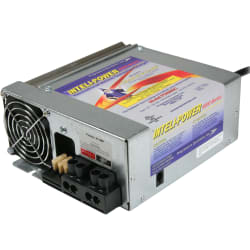What Happens When the RV Converter goes bad?
 If you've found yourself on this page, it's likely you're having some RV power converter problems. We understand that identifying signs of a bad converter can be daunting, so we are here to help! We've outlined a few key issues that could suggest the RV converter is bad, and we have also provided some quick troubleshooting tips:
If you've found yourself on this page, it's likely you're having some RV power converter problems. We understand that identifying signs of a bad converter can be daunting, so we are here to help! We've outlined a few key issues that could suggest the RV converter is bad, and we have also provided some quick troubleshooting tips:
Signs of a bad RV Power Converter:
Dead Battery / No Power:
When an RV converter is working properly, it is responsible for providing stable, reliable power to the DC side of the RV electrical system. These units work as a power supply while simultaneously charging the RV batteries. If you go into your RV and the 12V lights, water pump, or 12V accessories won’t turn on when it's plugged in, this indicates the RV Converter isn't functioning.
Even with dead batteries, the RV Converter will function as a power supply, so if nothing powers up on the 12v DC side, that points to an issue with the RV Converter.
Unusual Dimmed or Flickering Interior Lights:
If your RV Interior lights seem dimmer than normal, this generally indicates low DC voltage. The problem should resolve when you plug the RV into shore power or generator power. If the problem isn’t resolved after plugging in the RV, then this can mean your RV Converter is likely not powering up.
Flickering lights can be a sign that the RV Converter is having issues. Flickering is often caused by rapid voltage fluctuations and may result from low battery voltage, inconsistent output voltage, or improper grounding. Since the RV Converter works as a power supply and charger, sudden voltage drops could indicate the RV Converter is having issues providing continuous output, and your batteries are low.
Fans Spinning Slower than Normal:
If a vent fan, over-the-stove exhaust fan, or DC power ceiling fans turn slower than usual, this could indicate low DC voltage. If the problem doesn’t correct itself when the RV is plugged into shore power, it could point to the RV Converter having output issues.
Unusual Noise Coming from the RV Converter:
An unusual humming or buzzing noise from the RV Converter could indicate several issues. It could be as simple as the fan needing cleaning, or it could indicate other internal components starting to fail.
Overheating or Hot RV Converter:
Most RV converters have internal fans designed to keep the converter cool. These fans are typically thermal and load-controlled. This means the fan will turn on when the converter reaches a specific temperature or output load set by the manufacturer.
If you notice the fan never turns on after monitoring the converter for a while, and the converter is hot to the touch, this could indicate a failed converter fan. A failed fan can cause a converter to overheat and shut down, causing inconsistent power output.
Electrical Issues:
An RV Converter is the heart of your DC electrical system. When you notice multiple DC power issues, such as problems with your slide-outs or an appliance like the onboard heating system not working correctly. These issues can point to inconsistent power coming from the RV Converter.
Simple Troubleshooting Steps
Remember, your RV Converter will work as a power supply even when your batteries fail, so if you’re having issues with multiple devices, take the time to troubleshoot your RV Converter.
A voltmeter is generally all you will need to troubleshoot an RV Converter. Most RV converters will output between 13.6 volts and the mid-14 volt range. If you find the Converter output voltage doesn’t rise to these levels when powered on, you may want to check the fuses to be sure they are intact. A blown fuse generally indicates the batteries were connected in reverse or can point to a transformer issue.
Check to ensure the batteries are hooked up properly, and then check and replace any blown fuses. If the converter powers up with no issues, you are most likely back in business. If a fuse blows again, it could indicate the converter is surging above the fuse's amperage ratings. This issue generally points to a bad transformer and the need for a replacement RV converter.
BatteryStuff.com is here to help! If you have any questions, feel free to contact our techs. We are always happy to offer some advice, and if necessary, we have several smart charging replacement RV Converters.



